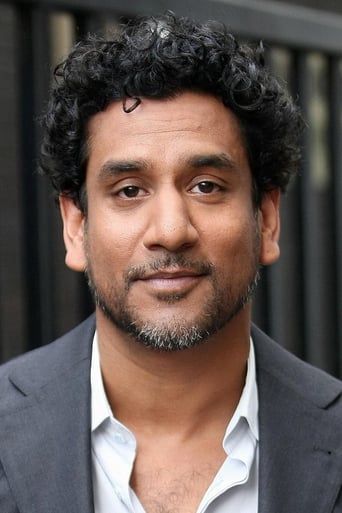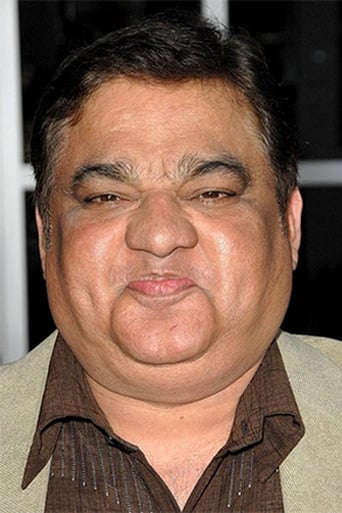ThiefHott
Too much of everything
Invaderbank
The film creates a perfect balance between action and depth of basic needs, in the midst of an infertile atmosphere.
Scarlet
The film never slows down or bores, plunging from one harrowing sequence to the next.
gavin6942
Karim's mother is English and his father is Indian. Therefore Karim has some problems with life in British society which is becoming more and more racist and intolerant; he experiences this especially when he wants to find himself a way of becoming an actor.While I know nothing about racism in England, especially in the 1970s, this was a rather interesting film because it had the Indian/English focus, as opposed to the black/white focus we tend to have with American films. It is a different dynamic, and I have to wonder how it all works there. I don't think of Indians as being one of the more hated racial groups, but in England you do have that colonialism stigma factored in.Naveen Andrews nailed it. I was not aware of who he was until "Lost", but this mini-series shows he was a great actor long before that. I have to wonder why he wasn't noticed sooner. Then again, he seems to be stuck with ethnically ambiguous roles (on "Lost" he was Iraqi), so maybe his full value is not appreciated yet.
transkei
The fact that this movie "American Desi" has become the focus of these ABCD's is sheer proof that they have missed the boat on the whole issue surrounding The Diaspora experience. Spoof it may be; but anything hedging upon reality; they will never know ...Back in the 70's when "East Meets West" / "Puhrab Au Pachim" came out, many questioned the actuality of such lifestyles actually becoming a reality.late 80's Buddha of Suburbia" by Hanif Quraishi/Ivory/Merchant production came out, giving us a truly deep insight to this sad phenomenon. Of the many Indo-Pak people I deal with - aged over 30, very few have ever heard of this movie - let alone have seen it.What is captured in Buddha of Suburbia is the many nuances and differences that exist between the old and the new - each taking pot-shots at each other and each looking more ridiculous than the other. I found the pace to be right on the mark - missing nothing.I suppose - having lived directly within these various cultures does give one a better understanding/insight to what Hanif is driving at. The story - told through Naveen's eyes really encapsulated every sublime - bizarre aspect of these cultures in conflict.Later movies such as Mississippi Masala and Monsoon Wedding (both worthy of mention) seem to fall a little short of The Buddha of Suburbia when dealing with so sensitive a topic and people ...What is more sad, is that many of those who do cleave (by whichever degree) to their culture tradition, language, religion, culinary skills, mode of dress, etc., are erroneously ridiculed as being FOB's.While the FOB's shake their heads in utter amazement at how distanced, these DESI's are from anything pertaining to India - these ABCD's turn up their noses at these "ignorant" FOB's. So it is, that these two groupings rarely connect with each other. In the DESI's attempt to become so modern/enlightened and superior, they sorely lack openness and understanding ...
Dr Jacques COULARDEAU
A surprising series from the BBC that comes to us from the rather distant time of 1993, but that speaks of the 1970s, the time of punk and the beginning of Margaret Thatcher who was already out when the mini series was produced. And they bring it out in 2007 in the DVD format. At last some may say. These time lags are very interesting because the meaning of the story is completely different according to the time you stand in. At the time of the arrival of Margaret Thatcher, the National Front was a real danger, and the mini-series shows it quite well and it is Margaret Thatcher who thwarted this National Front's ambition completely and utterly by recuperating their votes. It was a time when the left thought along the narrow line of an old model, that of the communist inspired unions, particularly the mineworkers' union, and of the Labor left of Tony Benn, the aristocrat turned a strict socialist. And they needed to be woken up to reality and they were by Margaret Thatcher again. They had to realize the old more or less violent and always intimidating methods were wrong and that the system of the free market economy was not collapsing at all because market economy was not, still is not and will certainly not be collapsing, even if its management is changing and will be changing maybe towards a more controlled, smooth and just functioning. The film looks at the extremely crucial issue of the time: the integration of the massive immigration from South Asia, Pakistan, India and Bangladesh. It considers this movement from a mixed point of view. First of all the point of view of the immigrants themselves, and particularly one young man who is the son of an Indian man and an English woman. His vision is always divided because he is mixing with people from both communities. It shows both his very Indian approach of personal relations that takes sex for what it is, nothing much except some kind of relaxing way of meeting with other people. Then the orientation is not important at all. But at the same time he desires some deep sentimental and emotional commitment and that runs in conflict with the English approach of things that more or less considers commitment like a downfall, a fault, a flaw in the free texture of life at the time. Since he is not an opportunist he ends up stepping out of a group in which sex was some kind of payment for a career, and since his profession is acting, that leads him to some kind of rather aloof position though all the more chased after because he appears hard to catch. At the same time we have the point of view of the white actors and directors who want to give Indians their chance to be well represented on the stage but then these Indians run into the African blacks who do not have the Indian distanciation (the Blacks are not beige enough as this young man says) and who consider a humorous discourse about Indian immigrants to be yielding to the white representation a society they essentially see as racist is imposing onto them. If you add to that the punk music of one of these white friends of the main actor's you have the full picture. This punk movement was definitely on one hand an extreme and excessive denunciation of white fascism but it also led at the time to the antagonistic movement of the skinheads who were racist and violent. In other words that was a time when things were very volatile and changing too fast for anyone to know which way they were going. That was the time of the squatters and the Claimants' Union. Strangely enough though most of these claimants were whites who wanted to use the social protection that had been set up after the war and up to the end of the 60s to live in poor but decent conditions, with no regular profession but plenty of time to prop up all kinds of protest movements. I remember the squats of the White Chapel area and the punk concerts of the Marquee and the Roundhouse of these mid and late mid 70s. That was a time worth living and that is a time worth remembering. This miniseries gives us a fair picture of what could today inspire us slightly more: there is no future for any country and the people of those countries if there is not a fair dose of freedom, diversity and hard work.Dr Jacques COULARDEAU, University Paris Dauphine, University Paris 1 Pantheon Sorbonne & University Versailles Saint Quentin en Yvelines
ytbufflo-1
I am coming out fighting here because this film was so well shot and so well cast that I am twice as angry about its de-evolution than I would have been with a lesser work. Without revealing too much of the plot, I can only say that part one of my 2 VHS set was an unnerving, unfolding delight of bizarre but plausible plot developments. The lead character was suitably naif-like but also intelligent and very very open. The events that he is rapidly forced to come to terms with are the separation of his parents, the culture shock when his Pakistani roots collide with a complete breakdown of English straitlaced society in the sixties, his father's dubious transformation into the revered Buddha of Suburbia, and the turning of his cousin into a feminist militant as his best friend suddenly becomes an icon of the burgeoning punk movement in the seventies. Among other things.What made me so angry was the amount of detailed work each actor put into creating and establishing their characters in the first part, only to have the whole thing devolve into very bad porn episodes in the second part, far too many to justify plot development, and far too explicit to even seem erotic. My biggest pet peeve is when directors let their private fetishes interfere with the truth of their movie, and this to me was a supreme example.I felt a bit like I'd been invited to a party of very clever, funny strangers, only to have the doors locked and the guests not allowed to interact, and all of us forced to watch bad seventies sexploitation films instead. What an insult to the hard work of these amazing actors! Why not just make a cheeseball flick to begin with? And why cast a great lead character who can actually act, and then cut away from him whenever he is building up to a great performance? I almost felt as if he too was growing tired of the endless sex scenes where all he did was lie there pumping his pelvis for yet another breathy naked actress.Bottom line - Part One is minor genius, Part Two is second tier soap opera perversion. I know the book is quite explicit, but I felt that these fine actors were as exploited in real life as their characters were in the movie, and it made me quite angry and very uncomfortable. Only John Waters can pull off such a dubious degrading of actors and plot and have it seem artistic. My suggestion is to only watch the first part, toss the second in the proverbial rubbish heap, and you will love the Buddha forever. Score A+F=0






